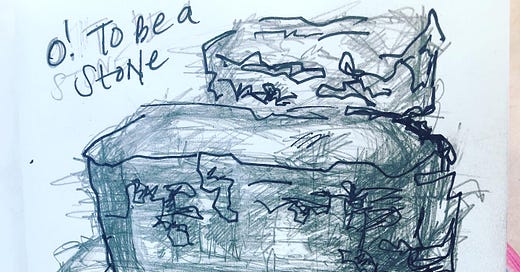His name was Petros, and at night we went rock climbing, while all day we worked with stones: raking them, moving them, building things with them, even watering them. I always envied the stones, seemingly immovable, changes imperceptible on a human scale. The stones don’t have to be anything, I thought; they simply exist, never striving, only sitting.
I wanted to be a stone because water was too vulnerable, its flow so easily altered, contained and constrained by an object in its path or surrounding its perimeter. I cringed at its feminine yielding, its tides pushed and pulled, at the mercy of seemingly more powerful planetary bodies. But stone was masculine, strong and resilient, layers of sediment calcified into something impenetrable over thousands of years.
I’m on a farm again, but on this farm, we work with rocks, and the stone walks around singing, “be like water,” a tune referencing Bruce Lee. And I know all too well that stone shapes water, but water also shapes stone; even the smallest rivulet can cut a canyon on a long enough timeline.
I wanted to be a stone because I didn’t want to face what was beneath. I have sedimentary layers composed of inadequacy and lack, deposited by a capitalist society built on competition and scarcity consciousness passed down through generations; cultural and familial messages mixed in that told me I was evil and flawed, my inner world, my thoughts and desires and behaviors betraying my desperate longing for piety, ricocheting between hedonistic excess and traumatic re-enactment followed by frantic purification for my putrid soul.
I ran from the feminine; called in the masculine; sought to fortify my liquid heart with shale and sandstone. Even now, on this trip, as I traipse through cities and farms, surrounded by divine mothers, the sacred feminine presence that was leading me ran off ahead, and I lagged behind, eventually losing her on the trail. I found stones littering the path, and I clung to them instead, but they started weighing too heavy, and the both-between requires balance.
Besides, nothing is stable. Everything is in motion when viewed over millennia; even mountains are running at their own speed. Both spiritual teachers and scientists will tell you that the only constant of the Universe is impermanence, and as for water, it doesn’t just receive. Water can be placid calm or wrathful rage, encapsulating all the feeling-states; calling us home in 98-percent resonance. And that’s why I’ve been resisting it, I know, but I don’t want to be a stone anymore; I want to feel.
I want to welcome the feminine back, not to the exclusion of the masculine, but in addition. To embrace she again, not to the exclusion of they, but as one of many parts of who I am. I want to feel the moon pull at my crimson tides and birth my own creations, bringing life into this world through the readable, the consumable, the relational. I want to give and receive love in all its forms, to surrender to the risk of relationship; to embrace my body, soul, and desires. I want to be the father and the mother, and to find the women again.
My body ached from the weight of all those rocks, but I followed him through the olive groves to a waterfall, and found water and stones coexisting in ethereal formation. The rock can never be like water, as the Hebrew prophet learned, but it can help build something beautiful.




